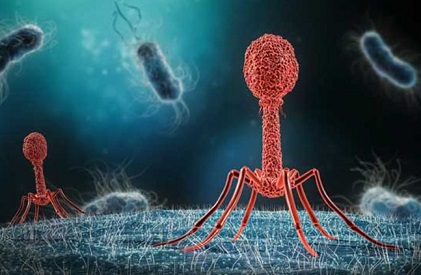Nikhil Prasad Fact checked by:Thailand Medical News Team Jul 08, 2024 1 year, 5 months, 3 weeks, 3 days, 4 hours, 5 minutes ago
Medical News:
Introduction to Mycobacteriophages
Imagine tiny viruses that specifically target bacteria, acting as nature's own bacterial hunters. These are bacteriophages, or phages, and they come in many varieties. One such type is the mycobacteriophage, which infects bacterial species like Mycobacterium tuberculosis and Mycolicibacterium smegmatis. Over 2400 of these mycobacteriophages have been discovered and sequenced, revealing a treasure trove of genetic information. This
Medical News report dives into a recent study that sheds light on the workings of a particular mycobacteriophage named Alexphander.
 Uncovering the Secrets of Mycobacteriophage Alexphander
What Are Mycobacteriophages?
Uncovering the Secrets of Mycobacteriophage Alexphander
What Are Mycobacteriophages?
Phages are viruses that prey on bacteria. They are the most numerous biological entities on Earth and are believed to have the ability to infect every bacterial species. This makes them crucial players in the evolution of bacterial communities and the composition of microbiomes. The study of phage-host interactions has been instrumental in advancing our understanding of molecular biology and has led to numerous biotechnological and therapeutic innovations.
The Discovery of Alexphander
Mycobacteriophage Alexphander was isolated, sequenced, and annotated as part of the SEA-PHAGES program at the University of California, Los Angeles-USA. Alexphander belongs to the F1 cluster of phages and has a genome that spans 57,734 base pairs, encoding 104 predicted genes. This phage is temperate, meaning it can exist in both lysogenic and lytic states. The focus of the study was to understand the function of one of its genes, gene 94.
Unveiling Gene 94
The Alexphander gene 94 encodes a protein believed to be essential for the phage's ability to infect and destroy its host. This protein contains a C-terminal helix-turn-helix (HTH) DNA-binding motif, typical of proteins that interact with DNA. Additionally, it has an N-terminal motif associated with stress-inducible gene products. Researchers from Towson University-Maryland-USA, including Emmanuel Chong Qui, Feben Habtehyimer, Alana Germroth, Jason Grant, Lea Kosanovic, Ivana Singh, and Stephen P. Hancock, set out to investigate the biochemical properties of this protein and its role in Alexphander's life cycle.
Gene 94: A Key Player in Lytic Infection
The researchers employed a technique called Bacteriophage Recombineering of Electroporated DNA (BRED) to delete gene 94 from the Alexphander genome.
They discovered that phages lacking this gene could not propagate in the absence of a complementation strain, confirming that gene 94 is indeed essential for the lytic growth of Alexphander. This finding was significant because it highlighted the importance of gene 94 in the phage's ability to hijack and destroy its bacterial host.
DNA Binding and Gene 94
Further experiments revealed that the protein encoded by gene 94, gp94, binds to double-stranded DNA w
ithout a strong preference for specific sequences. This nonspecific binding suggests that gp94 forms large complexes with DNA, which are essential for the phage's replication process. The study also showed that the highest levels of gene 94 mRNA are produced late in the lytic growth cycle, indicating that gp94 plays a crucial role in the later stages of phage infection.
Implications for Phage Biology
The findings of this study have broad implications for our understanding of phage biology. By uncovering the essential role of gene 94 in the life cycle of Alexphander, the researchers have provided new insights into the molecular mechanisms that phages use to infect and kill their bacterial hosts. This knowledge could potentially lead to the development of new phage-based therapies for bacterial infections, particularly in the face of rising antibiotic resistance.
Conclusion
In conclusion, the study of mycobacteriophage Alexphander and its gene 94 has revealed important details about the phage's ability to infect and destroy its bacterial host. This research underscores the importance of continued investigation into the molecular interactions between phages and their hosts, which could unlock new biotechnological and therapeutic applications.
The study findings were published in the peer-reviewed journal International Journal of Molecular Sciences.
https://www.mdpi.com/1422-0067/25/13/7466
For the latest on Mycobacteriophages, keep on logging to Thailand
Medical News.
Read Also:
https://www.thailandmedical.news/news/new-study-shows-that-foods-and-dietary-changes-can-influence-the-cultivation-of-bacteriophages-in-the-gut-according-to-needs
https://www.thailandmedical.news/news/breaking-forget-about-monkeypox-suspected-new-variant-of-salmonella-st34-strain-causing-new-outbreak-in-the-u-s-with-219-infected,-i-dead-and-12-in-ic
